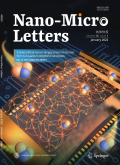纳微快报(英文)2024,Vol.16Issue(2):312-346,35.DOI:10.1007/s40820-023-01258-4
Nanoparticle Exsolution on Perovskite Oxides:Insights into Mechanism,Characteristics and Novel Strategies
Nanoparticle Exsolution on Perovskite Oxides:Insights into Mechanism,Characteristics and Novel Strategies
摘要
关键词
Supported nanoparticle/Exsolution/In situ growth/Mechanism/Perovskite oxide/CatalystKey words
Supported nanoparticle/Exsolution/In situ growth/Mechanism/Perovskite oxide/Catalyst引用本文复制引用
Yo Han Kim,Hyeongwon Jeong,Bo-Ram Won,Hyejin Jeon,Chan-ho Park,Dayoung Park,Yeeun Kim,Somi Lee,Jae-ha Myung..Nanoparticle Exsolution on Perovskite Oxides:Insights into Mechanism,Characteristics and Novel Strategies[J].纳微快报(英文),2024,16(2):312-346,35.基金项目
This study was supported by the National Research Foundation of Korea(NRF-2021R1C1C1010233)and funded by the Korean government(MSIT).This research was also supported by the Korea Institute of Energy Technology Evaluation and Planning(KETEP)Grant(No.G032542411),funded by the Korea Ministry of Trade,Industry,and Energy(MOTIE).Open access funding provided by Shanghai Jiao Tong University. (NRF-2021R1C1C1010233)

